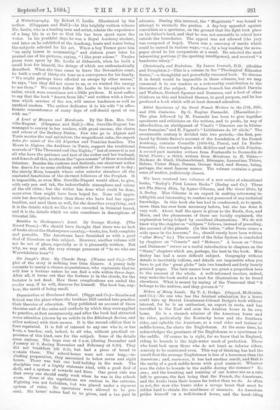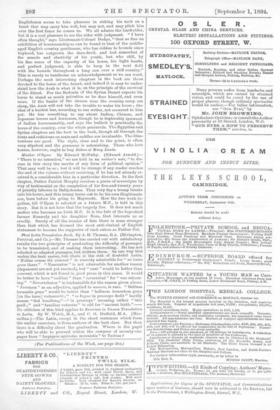Riders of Many Lands. By T. A. Dodge. (Osgood, MoIlvaine,
and Co.)—No one who has the faintest admiration for a horse could take up Brevet Lieutenant-Colonel Dodge's book without interest, for he is an enthusiast, an expert in seats, and has travelled to the East and seen the Arabian horse in its own home. He is a staunch admirer of the American horse and its rider, particularly the Kentucky horse and the Southern rider, and upholds the American, as a road rider and trainer of saddle-horses, far above the Englishman. At the same time, he acknowledges the greatness of the Englishman as a sportsman in the saddle. Of course he is right, for we know that in England, riding to hounds is the high-water mark of perfection. Those who hunt look upon those who do not hunt as inferior riders, scarcely to be mentioned even. This way of thinking has had the result that the average Englishman is less of a horseman than the American ; and, moreover, it has had another result, and that is the rarity of a good saddle-horse with good manners. Whoever sees the rider to hounds in the saddle during the summer ? No one ; and the breaking and training of our horses are as a rule left to grooms, the fact being that the French, the Americans, and the Arabs train their horses far better than we do. As often as not, the man who hunts rides a savage beast that must be ridden hard to obtain the semblance of manners. In American prides himself on a well-trained horse, and the hard-riding Englishman seems to take pleasure in risking his neck on a beast that may carry him well, but may not, and may pitch him over the first fence he comes to. We all admire the hard-rider, but it is a real pleasure to see the rider with judgment. " I have often thought," says Lieutenant-Colonel Dodge, "that as fine an exhibition of horsemanship as can he found is that of the middle- aged English country gentleman, who has ridden to hounds since boyhood, has outgrown the dare-devil, and lost somewhat of the muscle and elasticity of his youth, but who still, by his fine sense of the capacity of his horse, his light hands, and perfect judgment, is able to keep in the next field with the hounds throughout a long run over a stiff country." This is surely as handsome an acknowledgement as we can want. Perhaps the most interesting chapters in the book are those devoted to the horse of the desert, and indeed it is easy to under- stand how the Arab is what it is, on the principle of the survival of the fittest. For the Bedouin of the Syrian Desert expects his horse to stand as much privation as he does himself, and even more. If the banks of the stream near the evening camp are steep, the Arab will not take the trouble to water his horse ; the idea of a bucket has, according to our writer, not occurred to him yet. He has something to say about Indian, Chinese, and Japanese horses and horsemen, though he is deplorably ignorant of Indian horsemanship, and says the bullock is practically fhe horse of the country, over the whole peninsula. The Egyptian and Syrian chapters are the best in the book, though all through the hints and criticisms on seats and saddles are invaluable. The illus- trations are good. The style, clear and to the point, is often very slipshod, and the grammar is astonishing. Those who love horses, however, ought to buy Riders of Many Lands.



































 Previous page
Previous page